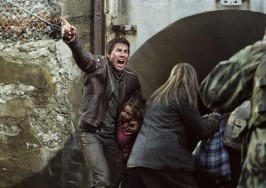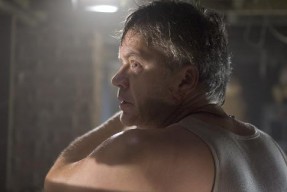|
War
of the Worlds
Forget about Tom Cruise, Katie Holmes, their newfound relationship,
Scientology, couch jumping, and all other aspects of the
recent media circus spectacle that has, and will, unfortunately
steal away attention to what really counts this week: War
of the Worlds is one helluva good film.
Period.
That’s
right, it’s out there, now let's deal with it. Spielberg
has gone above and beyond this time by shedding a good majority
of the soft-bellied undertones and pandering aspects that
have torpedoed other efforts of his lately. What results
is a film far grittier and bleak than nearly any other in
his repertoire. That is, save one.
Yes,
Schindler’s List still has the edge on Worlds,
largely due to its ties to historical hardships. No one
in their right mind would argue that. Yet what makes War
of the Worlds so intriguing is that the film could
very well fall right in line with some of the earlier work
put forth by the auteur. For some reason, subtle resemblances
to the likes of E.T., Jaws, Poltergeist, and Close
Encounters of the Third Kind seem to be employed here,
and say what you will about each of these films' individuality,
all are welcomed.
Spielberg’s
molting has unleashed a side of the director so grim and
dark in contrast that War of the Worlds almost
feels as if it were the product of a younger director altogether.
In fact, if it weren’t for the steady stream of typical
Spielbergian thematic necessities, one could easily assume
that some other helmer were responsible for the finished
product. Here, amongst the gloom and doom, we still manage
to establish themes of manhood, coming of age, and prerequisite
father and son arc.
The
film begins at a steady clip, establishing the splintered
and troubled Ferrier family as one containing a war of its
own on a microcosmic level. Ray (Cruise) seems eager to
hold on to his title as father underneath his childish,
dock working, and hot-rodding exterior. His children, Robbie
(Justin Chatwin) and Rachel (Dakota Fanning), epitomize
“jaded” in their own ways, and live with their
mother, Mary Anne (Miranda Otto) and her new beau Tim (David
Alan Basche).
Robbie
confines himself to hiding in his headphones and ignores Ray’s
attempts at parental exertion while Rachel’s mere actions,
albeit unintentional, seem to stab to the core of Ray’s
very soul. Otto plays Mary Anne as a mother whose only concern
is that of her children’s well being. She storms Ray’s
domicile in search of relief in finding adequate resources
to provide Robbie and Rachel with food, shelter, and ultimately
safety. Unfortunately for her, she finds no solace in the
status of Ray’s home.
What
Ray does have going for him in the eyes of Mary Anne is
his charm. Although Cruise, the actor, is currently learning
that his own charm is wearing thin, Ray still manages to
bring a smile to Mary Anne’s face to help ease her
worry.
Two-thirds
of way through this review, and it comes to mind that the
subject of aliens, invasion, and the extermination of mankind
has failed to even rear its ugly head as of yet. Like the
film, these aspects of the story are important here, but
they take a backseat to the underpinnings that make this
yarn work. When electromagnetic pulses begin showing up
in random places around the globe, the phenomenon is greeted
with not so much panic, but awe at the wonders of nature.
Could
this be fall out from global warming? Bizarre changes in
weather patterns? Who knows? Well, actually anyone with
ticket in hand knows better, but this approach to the scenario
never feels tongue in cheek as we see why these characters
approach it in this way. They have no reason to question
otherwise.
It doesn’t
take long for all of this to get set in motion, and by the
time the first tripod begins razing the city streets we are
firmly glued to our seats questioning the potential outcome
for the Ferriers. Lightning never strikes the same spot twice,
but what could possibly be in store for people who witness
firsthand as lightning strikes at precisely the same spot
twenty-six times in a row?
What
ensues is best described as homespun paranoia and anxiety.
Spielberg’s rather low key approach to a big budgeted
summer blockbuster provides a far more insightful and resonate
look at the resulting invasion. There is no roller coaster
ride sequence involving an untrained man from a working
class background taking the reigns of a stealthy fighter
craft and somehow figuring out how to defeat our invaders.
In fact, the survival perspective of one family is refreshing
as it draws into the foreground far more poignant themes
to explore in greater detail. When aliens invade, who will
we be truly at war with?
Amidst
a summer of weakened box office returns, it seems the film-going
public is far more reluctant to shell out for less than
worthy films. Truth be told, between this and Batman
Begins, the summer is actually shaping up nicely
in the content department.
Welcome
back, Steven. Welcome back.
Rating:

|








